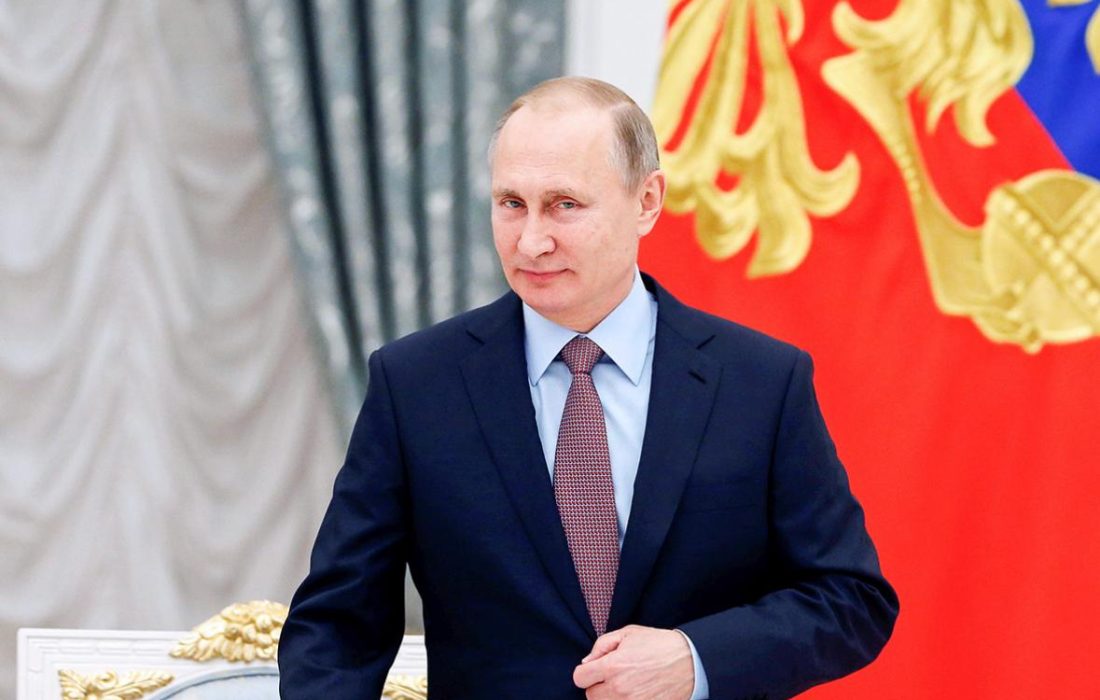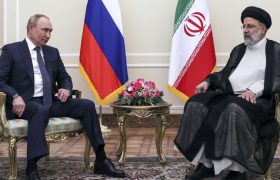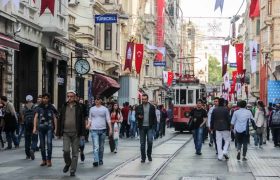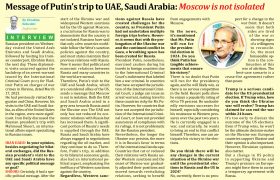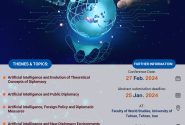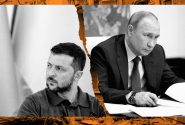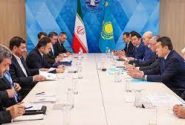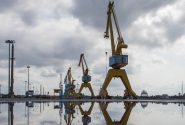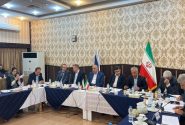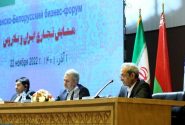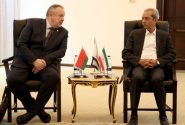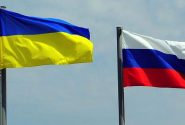Putin and post-soviet Russia
When Putin came to power in Moscow, most sectors of Russian state were engulfed in chaos to the point where the food security of main Russian cities was at risk. He successfully consolidated power, tamed the oligarchs, and uprooted the economic mafia which emerged after the Soviet Union. Putin accelerated military developments, increased oil and gas exports to an unprecedented level and made Russia an emerging economic power. During 2000s Russia a member of G8, participated as an equal to western industrialized countries in international forums. Russia’s extensive political and commercial relations in the world, went beyond intergovernmental relations and activated Russian tourism and sports diplomacy.
Although Putin’s voluminous achievements during 2000s were astonishing, he had a much more complicated mission to accomplish: directing the nation-building process in the frustrated Russia after the collapse of the Soviet Union. Russia is a country with a magnificent history, but the elements of this heritage is not compatible with each other.
Russia was one of the major powers of the 19th century and offered a galaxy of authors, artists and musicians to the world in the 19th and early 20th centuries. Then became the cradle for the most important revolution of the last century. Its communist rulers were determined to overthrow all remaining methods, creeds and organizations of the past, and build a new world. Hence Russia became the greatest laboratory of social and political systems of the last century which had to find a compatible alternative to the communist ideology for every human organization such as religion, market or social hierarchies. After the great victory in World War II, Russia became one of the two superpowers of the 20th century and the largest modern empire. Finally, within a few years, Soviet Union collapsed, Russia did not only lose its sphere of influence in Eastern Europe but also its imperial territory. The cold war was over and Russia was deeply humiliated. Putin had a Gigantic and momentous task ahead: Presenting a unified and harmonious narrative from this fragmented and inconsistent heritage, which clarifies for Russian people what it means to be Russian in the new century and what kind of country would be the post-Soviet Russia.
Putin’s absolute leadership is one of the components of state building in post-soviet Russia, which finds its way to nation building. During his reign, Putin industriously tried to instill the image of a clever and capable leader who does whatever it takes for development of Russia and protecting its interests. The slogan for his presidential campaign was: “strong president- strong Russia.”
The Russian networks occasionally release videos of Putin practicing judo, fishing in rivers and aviating, flaunting his fitness, strength and courage, which are in stark contrast to the physical and mental conditions of many world leaders. Also, by participating in numerous interviews with Western journalists, Putin represents the agility of his mind and mastery over Russian political and economic issues along with international relations.
But portraying Putin’s image is not just conducted by showing his physical power and adventurous spirit in government propaganda pictures or his adroitness in interviews with Western journalists. The shortcomings of previous Russian leaders are also mentioned, so that Putin’s magnitude would be more evident. Websites close to the Russian government openly criticize the short-sightedness and inefficiency of the leaders of the Soviet era, (specifically Khrushchev), and sometimes even scoff them (perhaps the only Soviet leader who is excluded from the criticism of Putin’s government is Andropov). Even Lenin, whose mummified body is still in Moscow’s Red Square, has been the target of Putin’s criticism. Broadcasting sarcasms and regrets about the leaders of the Soviet Union by the media close to the Russian government, articulate this message: the situation in Russia has changed, the incumbent Russian leader knows what is best for Russia and the failures of the past will never be repeated.
Extensive and naked Government propaganda for emphasizing Putin’s abilities may seem exaggerated, but it is in serves the needs of Russian society according to its historical context. Russia was always tormented by the tyranny and inefficiency of the Soviet leaders; After the collapse of the Soviet Union, not only lost its position as a superpower, but also encountered chaos in its internal affairs. Such a history has made a very serious issue in Russian society out of political leadership, and caused the distrust of Russian people to the rulers of Kremlin. Promoting a strong and knowledgeable ruler image has been one of Putin’s solutions for stabilizing the Russian society.
Current official narration about Russian history, has rejected the Soviet communist ideology, but the achievements of the communist era, such as nuclear and space developments and the victory in the Second World War, have been attributed to the ability and talent of Russian people. Orthodox Christianity is re-promoted in Russia, and the Russian ancient religious worldview guarantees the historical continuity of modern Russia to the pre–October Revolution. Pictures of Putin baptizing in the freezing cold have been broadcast many times by Russian networks.
Foreign policy considerations have played a crucial role in shaping the current narrative. After many trials and errors about the position and capabilities of modern Russia in its neighborhood, Putin government finally decided to change the birthplace of the Russian government from “Kyiv, the mother of Russian cities” to Novgorod, the first foothold of Vikings in Russia. The origin of baptism in Russia has changed from Kyiv, to Kherson near Sevastopol in Crimea. Efforts for citing history and offering a new narrative for post-Soviet Russia became part of Russian policy during conflicts with Ukraine in 2014. The old story of Novorossiya was repeatedly broadcasted by official media to provide a historical justification for the annexation of the Russian-speaking part of southeastern Ukraine.
Putin’s political, economic and security achievements were the guarantee for the success his efforts to define the new Russia and determine Russia’s place in contemporary world. When Putin’s leadership was accompanied with perceptible results such as economic prosperity and military victories without facing western reactions, not only Russia enjoyed worldwide prestige, but also Russian people supported his leadership and accepted his definition of post-Soviet Russia. Currently the Ukraine war has targeted the political, economic and security factors which are the foundation of Putin’s Russia. The longer the Ukraine war drags on, the less Putin’s nation-building will last in Russian history.
The Political Impacts of the Ukraine War on Russia’s International Position
The relationships were not close on the eastern bloc either. Sometimes, communist countries like China and Yugoslavia antagonized Russia. In most third-world countries too, the Soviet Union was less influential than the West. Although some third-world countries developed strategic relationships with the Soviet Union including military and intelligence cooperation or heavy industrial deals, the Soviets commonly played the role of the bargaining chip in their negotiations with the West. The communist ideology and the western propaganda made extensive relationship with the Soviet Union costly for the third-world countries, and could provide oppositionists with another pretext for protests.
Following the collapse of the Soviet Union, Russia put the expansion of worldwide relations especially with the West on its foreign policy agenda. After the rise of Putin to power, this approach was accelerated. Ridding of the Cold War and ideological considerations, Russia was now ready to fulfill its interests through engagement policy. The Russian diplomacy was activated in order to stabilize Russia’s place in the world. In sports diplomacy, Russia went so far as to win the hosting of the Sochi Winter Olympics and the Football World Cup. The escalation of geopolitical tensions over the Crimea annexation, however, interrupted the process.
This incident expelled Russia from the G8 countries. Sanctions were piled up against Russia and changed its global status. The Ukraine War and the unrivaled western sanctions intensified the process of isolation already activated after Crimea and reminded of Soviet Union’s solitude throughout the Cold War days. Once again, Russia is isolated, but has lost its allies in eastern Europe and parts of Africa, while many previous partners have turned to western allies. Today, like in the Cold War era, the expansion of relationships with Russia would amount to political confrontation with the West or internal opposition. Russia’s only trump card in international politics is its permanent membership in the UN Security Council as the legacy of the Soviet era. The elongation of the Ukraine War will not save Russia’s foreign policy and Putin’s endeavors to improve global relationships have reached the dead-end of failure.
Economic Impacts of Ukraine war on Russia
One of the major contributions of Putin during his time in office was to stabilize the chaotic Russian economy. Supply of goods was always a critical issue in soviet economy which mostly did not meet the production targets determined by economic plans. After the fall of U.S.S.R., Russian economy was in real chaos and the Yeltsin Government was unable to organize economy. Liberalization of Russian economy did not result in a competitive private sector, but bred the mafia bosses and extensive corruption.
Putin’s attempt for centralizing power included the call of order in economy: if an oligarch wanted to keep his territory, he had to be a loyal servant of the state, otherwise he would risk his empire or even his life. Although this violent way of governance in the Liberal framework might be regarded as a clear example of tyranny, or it may be condemned as an act of governmental interference due to classical economics, but at the time, in the context of instable Russian political and economic instability after the collapse of Soviet Union, was compatible to the ideals of Hobbes for stablishing order in a chaotic society.
Putin’s strategy for organizing the Russian economy has been taking control of the country’s major source of income. Russian economy depends on oil and gas and Putin devised for related companies to be under government control. He improved the relationship with these industries in a way that Dmitri Medvedev, an oil industry manager at the time, succeeded him as prime minister and later as president. Gazprom and the main oil and gas companies prospered under Medvedev and took hold of a significant part of the European market. From a western viewpoint, it was as if Russia has leveraged its gas resources against Europe.
The sustainable export of gas to Europe and Russia’s strong presence in the oil market as a major world producer led to a stable flow of international trade. Relying on oil and gas exports, Russia retained a persistent earning flow and a positive trade balance which was spent on importing goods. The economic boom of the 2000s made Putin a popular national figure.
Geopolitical confrontation with the West, however, proved highly costly for Russia’s export economy. Western sanctions following the annexation of Crimea were among the factors that cut Russia’s GDP from $2.293 trillion down to $1.277 trillion in 2016. Ever since, Russia’s GDP has not reached $2 trillion again and, considering western all-encompassing sanctions after the Ukraine war, the Russian economy does not seem to return to its bright days soon.
The longer the Ukraine war takes, the more expenses it incurs on Russia’s economy. Russia has one of the world’s largest gold reserves and has aggregated sumptuous foreign exchange reserves (about $300 billion) thanks to the gas and oil export income. Meanwhile, providing the heavy expenses of war is always burdensome for governments. Longitudinal wars devour large resources without promising economic gains in the short run. The longer the Ukraine war takes, Russia’s economy will undergo further pressure in a way that it might need to create money leading to a fall in Ruble and an increase in prices.
Western comprehensive sanctions against Russia will have important economic consequences. For an economy dependent on oil and gas exports and importing much of its commodities, sanctions mean considerable obstacles against trade that translates to increased prices of trading, imports, and living costs for Russians. Sanctions will cut Russia’s energy export and reduce income in the coming years. Although Russia has devised for expanding cooperation with and exporting oil to the Far East (particularly China), replacing Europe in Russia’s energy basket would be a time-consuming process. This is while the curtailed income is an instant reality that introduces the country to one of its biggest economic challenges since the collapse of the Soviet Union. Russian economy encounters the danger of either inflation or stagnation in the coming years which does not seem to be manageable relying on foreign resources. This prospect hardly pleases the majority of the Russian population.
Ukraine War and its Impact on Russia’s Military Reputation
With the rise of Putin to power and until the Ukraine War, Russia’s military used to be the absolute triumphant on every war front. The Georgian War and the Crimea annexation verified the Russian military as the modern successor of the Red Army. At the onset of the Ukraine War, the world trembled with Russia’s military might. Finland and Sweden appealed for NATO membership subsequential to the incident, and the financial market of the eastern neighbor Japan revealed similar concerns. On its anniversary, however, the war shows no prospect of victory for Moscow. Russia’s failed attempts against a rather weak enemy once part of its territory and later one of its republics has damaged the military power of Russia.
To win this war, Russia needs aid and has already publicized enjoying Iran’s military advice. Although this confession might be in line with Russian interests and influential on Iran’s international position, enjoying the counseling of a third party in the war with a neighboring country is hardly to benefit of the Red Army heir’s reputation. The western media siren over Russia’s inevitable reliance on nuclear weapons further agitates Russians over their inability in concluding the war, a long-shot alternative that no nuclear state has opted for since WWII.
Putin took advantage of the assistance of military proxies to avoid direct engagement in Libya. Besides logistic reasons and averting the political consequences, some commentators point to other reasons behind Putin’s sidestepping from direct engagement, including his concern over the bitter repetition of Afghanistan casualties in the Soviet era. apart from the military defeat, Afghanistan War is a reminder of the Soviet collapse. Meanwhile, a yearlong frustrating war in Ukraine has left no place for discretion. The Russian military has initiated a war that has no prospect of a happy ending.
Putin has remarked several times that the aim of this war is protecting Russian’s security. Therefore, the endlessness of this war one year on conveys the message that Russia is unable to protect its people. This message levies an unpleasant impact on Russians’ psyche; the Ukraine War is a catastrophe for Russia’s military standing within Russia and beyond.
Ukraine War, Putin, and the Future of Russia
It would be simplistic to believe the consequences of the Ukraine War have been completely exposed so far. The West will not lift Russia sanctions, deeply isolating Russia politically and economically for the first time in its post-Soviet history. The escalation of the economic situation and the tarnished reputation of the Russian military impair Putin’s nation-building attempts. Putin managed to project the image of a potent and prudent (though authoritarian) leader in the past twenty years. His failure in concluding the Ukraine War can disturb this image forever. Instead of the wise leader who led the post-Soviet Russia into its unique global place, Putin will be remembered for his failure in establishing post-Soviet Russia.
This war will add to Russian citizens’ distrust in Kremlin. Under such circumstances, Putin will lose popularity and his narrative of post-Soviet Russia will not sell. The images of Russian youths who line up behind borders to escape recruitment for war indicate that they do not want to die for Putin’s Russia. If the Afghanistan War was the end of the Soviet Union for the Russian people, the Ukraine War is for them the end of Putin’s dreams of Russia. To usher the new days, Russia must eye the end of Putin’s era.


